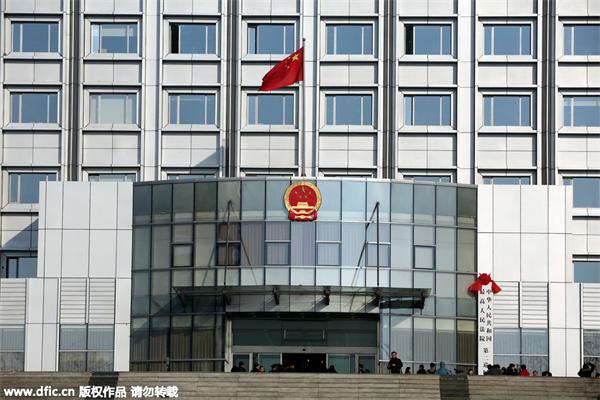New rules for lawsuits step in right direction
Updated: 2015-05-06 07:49
(China Daily)
|
|||||||||||
 |
|
The Second Circuit Court of China’s Supreme People’s Court in Shenyang, Liaoning province. [Photo/IC] |
The first working day after the country's court system officially inaugurated a new case registration mechanism saw a 20-percent rise in the number of cases filed.
That is amazing, yet well within anticipation.
Under previous rules, there was plenty of latitude for a court to refuse a case. That was why many cases, especially those against government offices and their functionaries, had little chance of making it into judicial procedure.
Now, courts are obliged to accept all cases, unless they are in clear violation of the law, fail to meet the stipulated conditions for litigation, judicial proceedings on them have closed, or they threaten national security or are beyond the court's jurisdiction.
Further details remain unavailable about the composition of the cases registered on the first day. But it is safe to assume a considerable proportion of the increase can be attributed to cases against administrative representatives.
The new rules have opened a door to administrative lawsuits which otherwise would have entertained no possibility of entering the courtroom. The hopes of many people for justice in disputes against government agencies were reduced by the previous order from the central government that disputes with local governments and officials should be solved locally.
No court is interested in lawsuits that have the potential to pit it against the local authorities, particularly against the leading officials. To date at least, many courts remain at the mercy of local administrators for routine necessities. In such a situation, things will not change much even after a lawsuit against a local authority or one of its officials is accepted.
The recent establishment of cross-region courts under the direct jurisdiction of the Supreme People's Court is a worthy experiment, but it is unrealistic to subject all local courts to its oversight. Nevertheless, it is essential to liberate courts from local authorities' sphere of influence.
But this is far from the end of the story. Following the introduction of the new rules, we need to know what kind of litigation violates the law, what conditions the law stipulates, and what lawsuits threaten national security.
Otherwise, these gaping holes will simply prove another graveyard for certain kinds of lawsuits.
Related Stories
Court's transparency in trial welcomed 2015-04-30 07:44
Pingnan's court grants left-behind children's wishes 2015-04-27 16:21
High court weighs gay marriage 2015-04-27 07:51
Court sentences Morsi to 20 years 2015-04-22 07:39
Today's Top News
Reasons behind Russia's high-profile V-Day celebrations
Wang Jianlin: Asia's richest man
China regulator denies Siemens bribery probe
Milan-Shanghai flight to 'establish important bridge'
Xi meets visiting KMT chairman
Siemens healthcare unit probed by China regulator for bribery
UK urged to ease up on visa curbs
Chinese president to visit Russia, Kazakstan, Belarus,attend WWII celebration in Moscow
Hot Topics
Lunar probe , China growth forecasts, Emission rules get tougher, China seen through 'colored lens', International board,
Editor's Picks

|

|

|

|

|

|






